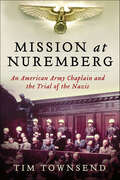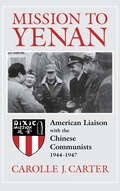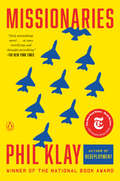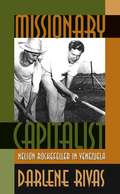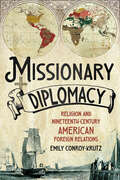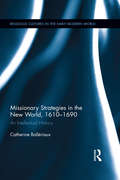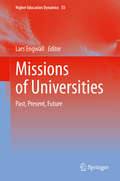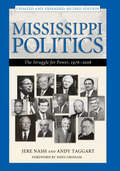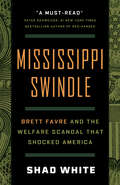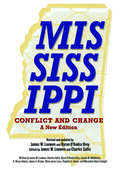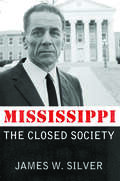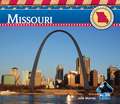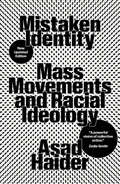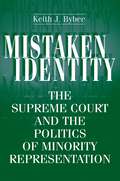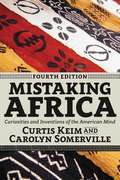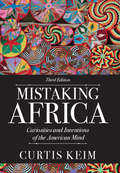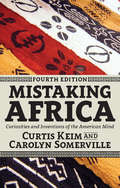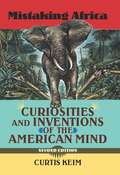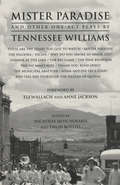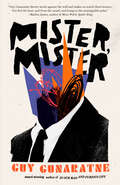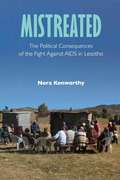- Table View
- List View
Mission at Nuremberg: An American Army Chaplain and the Trial of the Nazis
by Tim Townsend“Just when you think there could be nothing new to say about the Nazis, here’s a unique account that raises pressing moral and spiritual issues.” —Library JournalLutheran minister Henry Gerecke was fifty years old when he enlisted as an Army chaplain during World War II. As two of his three sons faced danger and death on the battlefield, Gerecke tended to the battered bodies and souls of wounded and dying GIs outside London. At the war’s end, when other soldiers were coming home, Gerecke was recruited for the most difficult engagement of his life: ministering to the twenty-one Nazis leaders awaiting trial at Nuremburg.Based on scrupulous research and first-hand accounts, including interviews with still-living participants and featuring sixteen pages of black-and-white photos, Mission at Nuremberg takes us inside the Nuremburg Palace of Justice, into the cells of the accused and the courtroom where they faced their crimes. As the drama leading to the court’s final judgments unfolds, Tim Townsend brings to life the developing relationship between Gerecke and Hermann Goering, Albert Speer, Wilhelm Keitel, Joachim von Ribbentrop, and other imprisoned Nazis as they awaited trial.Powerful and harrowing, Mission at Nuremberg offers a fresh look at one most horrifying times in human history, probing difficult spiritual and ethical issues that continue to hold meaning, forcing us to confront the ultimate moral question: Are some men so evil they are beyond redemption?“A gripping story . . . puts the reader inside the cells of various Hitler henchmen.” —The Wichita Eagle“Townsend authoritatively addresses the excruciating moral and religious issues confronting wartime chaplains . . . rich, potentially explosive.” —Kirkus Reviews
Mission to Yenan: American Liaison with the Chinese Communists, 1944–1947
by Carolle J. CarterA deep dive into the Dixie Mission. “Aficionados of American political and diplomatic history may be pleasantly surprised at the riches in this book.” —American Historical ReviewConventional wisdom informs us that “only Nixon could go to China.” In fact, in 1944, nearly thirty years before his historic trip, the American military established the first liaison and intelligence-gathering mission with the Chinese Communists in Yenan. Commonly referred to as the Dixie Mission, the detached military unit sent to Yenan was responsible for transmitting weather information, assisting the Communists in their rescue of downed American flyers, and laying the groundwork for an eventual rapprochement between the Communists and Nationalists, the two sides struggling in the ongoing Chinese Civil War.Following extensive use of archival sources and numerous interviews with the men who traveled and served in Yenan, Carolle Carter argues that while Dixie fulfilled its assignment, the members steered the mission in different directions from its original, albeit loosely described, intent. As the months and years passed, the Dixie Mission increasingly emphasized intelligence gathering over evaluating their Communist hosts’ contribution to the war effort against Japan.Some American politicians in the 1950s portrayed the participants in the Dixie Mission as too sympathetic to the Chinese Communists. But during the 1970s many looked back at these individuals as wise but ignored oracles who could have prevented the “loss of China.” Carter strips away these simplistic portrayals to reveal a diverse and dedicated collection of soldiers, diplomats, and technicians who had ongoing contact with the Chinese Communists longer than any other group during World War II, but who were destined to be a largely unused resource during the Cold War.
Mission: An American Congressman's Voyage to Space
by Bill Nelson14th NASA administrator and US Senator Bill Nelson’s account of an unforgettable Space Shuttle missionIn January 1986, US congressman and future NASA leader Bill Nelson flew on the six-day mission of the Space Shuttle Columbia. Nelson conducted medical experiments, including cancer research and the first American stress test in space. Mission is Nelson’s account of this journey, originally published two years after the flight and now available in this paperback edition with a new preface.In this book, Nelson recounts how he was selected as a payload specialist and details his training regimens with the crew for the flight and mission. He describes the experience of launch, living in zero gravity, and returning to Earth. Nelson also addresses the Space Shuttle Challenger disaster, which happened just 10 days after his own mission ended, discussing its impact on himself and the nation and the changes in NASA mission directives that followed. The book includes Nelson’s early perspectives on the goals and principles of the US space program, the value of conducting research in weightless environments, and the necessity of collaborations in developing advanced space technologies.Mission offers a fascinating window into the Space Shuttle program during the pre-Challenger era. Forty years later, NASA has seen the completion of the International Space Station, long-term partnerships with other national space agencies, and the expanding role of private space companies. Nelson’s hopes and predictions in these areas are significant contributions to space history and markers that show how far the space program has come.
Missionaries: A Novel
by Phil KlayThe debut novel from the National Book Award-winning author of Redeployment"[This] compact epic of a novel contains perhaps Klay's finest writing yet . . . Using his formidable gifts for scene-setting, meaningful irony and deep human empathy, Klay weaves together a set of stories over the course of nearly three decades . . . Amid raging fires and illness and constitutional crises, Klay's book roars something vital: Never forget about war or the blood and bone and the evil and the reckless idealism of who we all really are." --Los Angeles TimesA group of Colombian soldiers prepares to raid a drug lord's safe house on the Venezuelan border. They're watching him with an American-made drone, about to strike using military tactics taught to them by U.S. soldiers who honed their skills to lethal perfection in Iraq. In Missionaries, Phil Klay examines the globalization of violence through the interlocking stories of four characters and the conflicts that define their lives.For Mason, a U.S. Army Special Forces medic, and Lisette, a foreign correspondent, America's long post-9/11 wars in the Middle East exerted a terrible draw that neither is able to shake. Where can such a person go next? All roads lead to Colombia, where the US has partnered with local government to keep predatory narco gangs at bay. Mason, now a liaison to the Colombian military, is ready for the good war, and Lisette is more than ready to cover it. Juan Pablo, a Colombian officer, must juggle managing the Americans' presence and navigating a viper's nest of factions bidding for power. Meanwhile, Abel, a lieutenant in a local militia, has lost almost everything in the seemingly endless carnage of his home province, where the lines between drug cartels, militias, and the state are semi-permeable. Drawing on six years of research in America and Colombia into the effects of the modern way of war on regular people, Klay has written a novel of extraordinary suspense infused with geopolitical sophistication and storytelling instincts that are second to none. Missionaries is a window not only into modern war, but into the individual lives that go on long after the drones have left the skies.
Missionary Capitalist
by Darlene RivasThe first work to draw on Nelson A. Rockefeller's newly available personal papers as well as research in Latin American archives, Missionary Capitalist details Rockefeller's efforts to promote economic development in Latin America, particularly Venezuela, from the late 1930s through the 1950s. Rockefeller's involvement in the region began in 1936 with his investment in Creole Petroleum, the Venezuelan subsidiary of Standard Oil. Almost immediately, he began trying to influence North Americans' individual, corporate, and government relationships with Latin Americans. Through his work developing technical assistance programs for the Roosevelt administration during World War II, his business ventures (primarily agricultural production and food retailing), and his postwar founding of the nonprofit American International Association, Rockefeller hoped to demonstrate how U.S. capitalists could nurture entrepreneurial spirit and work successfully with government agencies in Latin America to encourage economic development and improve U.S.-Latin American relations. Ultimately, however, he overestimated the ability of the United States, through public or private endeavors, to promote Latin American economic, political, and social change. This objective account paints a portrait of Rockefeller not as the rapacious, exploitative figure of stereotype, but as a man fueled by idealism and humanitarian concern as well as ambition.
Missionary Diplomacy: Religion and Nineteenth-Century American Foreign Relations
by Emily Conroy-KrutzMissionary Diplomacy illuminates the crucial place of religion in nineteenth-century American diplomacy. From the 1810s through the 1920s, Protestant missionaries positioned themselves as key experts in the development of American relations in Asia, Africa, the Pacific, and the Middle East. Missionaries served as consuls, translators, and occasional trouble-makers who forced the State Department to take actions it otherwise would have avoided. Yet as decades passed, more Americans began to question the propriety of missionaries' power. Were missionaries serving the interests of American diplomacy? Or were they creating unnecessary problems? As Emily Conroy-Krutz demonstrates, they were doing both. Across the century, missionaries forced the government to articulate new conceptions of the rights of US citizens abroad and of the role of the US as an engine of humanitarianism and religious freedom. By the time the US entered the first world war, missionary diplomacy had for nearly a century created the conditions for some Americans to embrace a vision of their country as an internationally engaged world power. Missionary Diplomacy exposes the longstanding influence of evangelical missions on the shape of American foreign relations.
Missionary Strategies in the New World, 1610-1690: An Intellectual History (Religious Cultures in the Early Modern World)
by Catherine BallériauxThe study is an intellectual and comparative history of French, Spanish, and English missions to the native peoples of America in the seventeenth century, c. 1610–1690. It shows that missions are ideal case studies to properly understand the relationship between religion and politics in early modern Catholic and Calvinist thought. <P><P>The book aims to analyse the intellectual roots of fundamental ideas in Catholic and Calvinist missionary writings—among others idolatry, conversion, civility, and police—by examining the classical, Augustinian, neo-thomist, reformed Protestant, and contemporary European influences on their writings. Missionaries’ insistence on the necessity of reform, emphasising an experiential, practical vision of Christianity, led them to elaborate conversion strategies that encompassed not only religious, but also political and social changes. It was at the margins of empire that the essentials of Calvinist and Catholic soteriologies and political thought could be enacted and crystallised. By a careful analysis of these missiologies, the study thus argues that missionaries’ common strategies—habituation, segregation, social and political regulations—stem from a shared intellectual heritage, classical, humanist, and above all concerned with the Erasmian ideal of a reformation of manners.
Missions of Universities: Past, Present, Future (Higher Education Dynamics #55)
by Lars EngwallThis book provides an analysis of university missions over time and space. It starts out by presenting a governance framework focusing on the demands on universities set by regulators, market actors and scrutinizers. It examines organizational structures, population development, the fundamental tasks of universities, and internal governance structures. Next, the book offers a discussion of the idea and role of universities in society, exploring concepts such as autonomy and universality, and the university as a transformative institute. The next four chapters deal with the development of universities from medieval times, through the Renaissance, towards the research universities in the nineteenth century in Europe and the United States. The following five chapters analyse recent developments of increasing external demands manifested through evaluations, accreditations and rankings, which in turn have had effects on the organization of universities. Topics discussed include markets, managers, globalization, consumer models and competition. The book concludes by a discussion and analysis of the future challenges of universities.
Mississippi Politics: The Struggle for Power, 1976-2008, Second Edition
by Jere Nash Andy TaggartOriginally published in 2006, Mississippi Politics quickly became the definitive work on the state's recent political history, campaigns, legislative battles, and litigation, as well as how Mississippi shaped and was shaped by national and regional trends. A central theme of the 2006 edition was the state's gradual transition from a Democratic surety to a Republican stronghold. For this updated edition, authors Jere Nash and Andy Taggart examine the aftermath of the 2007 gubernatorial and 2008 presidential elections—and all the fireworks in between. This new edition adds a chapter covering the last two years and includes analyses of the 2007 and 2008 statewide, legislative, and federal elections; the resignations of Senator Trent Lott and Congressman Chip Pickering; the indictments of Richard Scruggs and other prominent lawyers; President Barack Obama's influence on the state's 2008 voting dynamics; and the election of House Speaker Billy McCoy.
Mississippi Swindle: Brett Favre and the Welfare Scandal that Shocked America
by Shad WhiteHow America&’s youngest state auditor uncovered the largest public corruption scandal in the history of the nation&’s poorest state&“A must read&” with all the thrills of a John Grisham novel — for fans of shocking true crime exposés like Black Edge and Bad Blood (Peter Schweizer, author of Secret Empires)This riveting exposé details how a small team of auditors and investigators, led by the youngest State Auditor in the country, uncovered a brazen scheme where the powerful stole millions in welfare funds from the poor in a sprawling conspiracy that stretched from Mississippi to Malibu.Well-connected donors, highly placed officials, and popular public figures diverted tens of millions of dollars from the federal government's TANF — temporary assistance for needy families — program until a Republican auditor, his small team of dedicated investigators, and a Democratic prosecutor joined forces to hold them accountable in the face of intense obstruction and harassment.Peopled with unforgettable characters — from the perpetrators; to the impoverished citizens for whom the money was intended; to the investigators, prosecutors, and reporters who held them to account — Mississippi Swindle is a political and true crime drama that highlights larger crises while appealing to a broad nationwide audience.
Mississippi, Conflict and Change: A New Edition
by James W. Loewen James A. Brown Charles Sallis Byron D’Andra Orey Jeanne M. Middleton R. Bruce Adams Olivia Jones Love Stephen C. Immer Maryellen Hains ClampitWritten by James W. Loewen, Charles Sallis, Byron D’Andra Orey, Jeanne M. Middleton, R. Bruce Adams, James A. Brown, Olivia Jones Love, Stephen C. Immer, and Maryellen Hains Clampit Originally published in 1974, Mississippi, Conflict and Change was a textbook that explored Mississippi’s history from its earliest days to modern times, emphasizing social dynamics and key contemporary events, especially the civil rights movement and the pursuit of equality. The book was innovative for its era, offering a nuanced and truthful depiction of Mississippi’s past, particularly regarding slavery, the Civil War, Reconstruction, and the civil rights era. At the time, the textbook was deemed radical by some because of its factual recounting of the state’s history and inclusion of such historically overlooked groups as African Americans, Native Americans, and women. The book challenged the conventional approach to teaching history in Mississippi and was not approved by the state’s textbook review committee. Its adoption in the public education system was denied until a well-publicized and successful lawsuit was brought against the state by the authors and publisher. Mississippi, Conflict and Change has been out of print for many years and only available as a collector’s item until now. This new edition includes an introduction telling the history of the book’s publication along with updates throughout the text, made by acclaimed author James W. Loewen. Picking up the reins after Loewen’s death in 2021, Byron D’Andra Orey provides new text on contemporary politics, culture, and the economy, bringing the history of the state up to date. Intended for students as well as general readers, Mississippi, Conflict and Change: A New Edition revives an integral text in Mississippi history.
Mississippi: The Closed Society
by James W. SilverMississippi: The Closed Society is a book about an insurrection in modern America, more particularly, about the social and historical background of that insurrection. It is written by a Mississippian who is a historian, and who, on September 30, 1962, witnessed the long night of riot that exploded on the campus of the University of Mississippi at Oxford, when students, and, later, adults with no connection with the University, attacked United States marshals sent to the campus to protect James H. Meredith, the first African American to attend Ole Miss. In the first part of Mississippi: The Closed Society, Silver describes how the state's commitment to the doctrine of white supremacy led to a situation in which the Mississippian found that continued intransigence (and possibly violence) was the only course offered to him. In these chapters the author speaks in the more formal measures of the historian. In the second part of the book, “Some Letters from the Closed Society,” he reproduces (among other correspondence and memoranda) a series of his letters to friends and family—and critics—in the days and weeks after the insurrection. Here he reveals himself more personally and forcefully. In both parts of the book are disclosed the mind and heart of the Mississippian who is as haunted as William Faulkner was by the moral chaos of his native land.
Missouri (Explore the United States)
by Julie MurrayThis comprehensive, informative, easy-to-read text explores the state of Missouri. Readers journey through Missouri as they learn about its history, cities, land features, animals, industries, sports, famous people, and more! A "Tour Book" spread highlights kid-friendly things to do in Missouri.
Mistaken Identity: Race and Class in the Age of Trump
by Asad HaiderA powerful challenge to the way we understand the politics of race and the history of anti-racist struggleWhether class or race is the more important factor in modern politics is a question right at the heart of recent history’s most contentious debates. Among groups who should readily find common ground, there is little agreement. To escape this deadlock, Asad Haider turns to the rich legacies of the black freedom struggle. Drawing on the words and deeds of black revolutionary theorists, he argues that identity politics is not synonymous with anti-racism, but instead amounts to the neutralization of its movements. It marks a retreat from the crucial passage of identity to solidarity, and from individual recognition to the collective struggle against an oppressive social structure.Weaving together autobiographical reflection, historical analysis, theoretical exegesis, and protest reportage, Mistaken Identity is a passionate call for a new practice of politics beyond colorblind chauvinism and “the ideology of race.”
Mistaken Identity: The Supreme Court and the Politics of Minority Representation
by Keith J. BybeeIs it ever legitimate to redraw electoral districts on the basis of race? In its long struggle with this question, the U.S. Supreme Court has treated race-conscious redistricting either as a requirement of political fairness or as an exercise in corrosive racial quotas. Cutting through these contradictory positions, Keith Bybee examines the theoretical foundations of the Court's decisions and the ideological controversy those decisions have engendered. He uncovers erroneous assumptions about political identity on both sides of the debate and formulates new terms on which minority representation can be pursued. As Bybee shows, the Court has for the last twenty years encouraged a division between individualist and group concepts of political identity. He demonstrates convincingly that both individualist and group proponents share the misguided notion that political identity is formed prior to and apart from politics itself. According to Bybee, this "mistaken identity" should be abandoned for a more flexible, politically informed understanding of who the "people" really are. Thus, a misdirected debate will be replaced by a more considered discussion in which the people can speak for themselves, even as the Court speaks on their behalf. Engaged in the politics of minority representation, the Court will be able to help citizens articulate and achieve more fruitful forms of political community.
Mistaking Africa: Curiosities and Inventions of the American Mind
by Curtis A. Keim Carolyn SomervilleFor many Americans the mention of Africa immediately conjures up images of safaris, ferocious animals, strangely dressed "tribesmen," and impenetrable jungles. Although the occasional newspaper headline mentions authoritarian rule, corruption, genocide, devastating illnesses, or civil war in Africa, the collective American consciousness still carries strong mental images of Africa that are reflected in advertising, movies, amusement parks, cartoons, and many other corners of society. Few think to question these perceptions or how they came to be so deeply lodged in American minds. Mistaking Africa looks at the historical evolution of this mind-set and examines the role that popular media plays in its creation. The authors address the most prevalent myths and preconceptions and demonstrate how these prevent a true understanding of the enormously diverse peoples and cultures of Africa. Updated throughout, the fourth edition covers the entire continent (North and sub-Saharan Africa) and provides new analysis of topics such as social media and the Internet, the Ebola crisis, celebrity aid, and the Arab Spring. Mistaking Africa is an important book for African studies courses and for anyone interested in unraveling American misperceptions about the continent.
Mistaking Africa: Curiosities and Inventions of the American Mind
by Curtis A KeimFor many Americans the mention of Africa immediately conjures up images of safaris, ferocious animals, strangely dressed "tribesmen," and impenetrable jungles. Although the occasional newspaper headline mentions genocide, AIDS, malaria, or civil war in Africa, the collective American consciousness still carries strong mental images of Africa that are reflected in advertising, movies, amusement parks, cartoons, and many other corners of society. Few think to question these perceptions or how they came to be so deeply lodged in American minds. Curtis Keim's Mistaking Africa looks at the historical evolution of this mind-set and examines the role that popular media plays in its creation. Keim addresses the most prevalent myths and preconceptions and demonstrates how these prevent a true understanding of the enormously diverse peoples and cultures of Africa. Updated throughout, the third edition includes a new chapter, "Where Is the Real Africa," discussing the multifaceted nature of the question and the importance of not grasping onto stereotypes of Africa's mythical past. Keim also includes new examples and new images to expand the visual narrative of western views about Africa. Mistaking Africa is an important book for African studies courses and for anyone interested in unraveling American misperceptions about the continent.
Mistaking Africa: Curiosities and Inventions of the American Mind
by Curtis KeimFor many Americans the mention of Africa immediately conjures up images of safaris, ferocious animals, strangely dressed "tribesmen,” and impenetrable jungles. Although the occasional newspaper headline mentions genocide, AIDS, malaria, or civil war in Africa, the collective American consciousness still carries strong mental images of Africa that are reflected in advertising, movies, amusement parks, cartoons, and many other corners of society. Few think to question these perceptions or how they came to be so deeply lodged in American minds. Curtis Keim’s Mistaking Africa looks at the historical evolution of this mind-set and examines the role that popular media plays in its creation. Keim addresses the most prevalent myths and preconceptions and demonstrates how these prevent a true understanding of the enormously diverse peoples and cultures of Africa. Updated throughout, the third edition includes a new chapter, "Where Is the Real Africa," discussing the multifaceted nature of the question and the importance of not grasping onto stereotypes of Africa’s mythical past. Keim also includes new examples and new images to expand the visual narrative of western views about Africa. Mistaking Africa is an important book for African studies courses and for anyone interested in unraveling American misperceptions about the continent.
Mistaking Africa: Curiosities and Inventions of the American Mind
by Curtis KeimFor manyAmericans the mention of Africa immediately conjures up images of safaris,ferocious animals, strangely dressed "tribesmen," and impenetrable jungles.Although the occasional newspaper headline mentions authoritarian rule,corruption, genocide, devastating illnesses, or civil war in Africa, thecollective American consciousness still carries strong mental images of Africathat are reflected in advertising, movies, amusement parks, cartoons, and manyother corners of society. Few think to question these perceptions or how theycame to be so deeply lodged in American minds. Mistaking Africa looks at the historical evolution of this mind-setand examines the role that popular media plays in its creation. The authorsaddress the most prevalent myths and preconceptions and demonstrate how theseprevent a true understanding of the enormously diverse peoples and cultures ofAfrica.Updatedthroughout, the fourth edition covers the entire continent (North andsub-Saharan Africa) and provides new analysis of topics such as social mediaand the Internet, the Ebola crisis, celebrity aid, and the Arab Spring. Mistaking Africa is an important bookfor African studies courses and for anyone interested in unraveling Americanmisperceptions about the continent.
Mistaking Africa: Curiosities and Inventions of the American Mind, Second Edition
by Curtis KeimAn engaging and now newly updated exploration of the origins of American stereotypes about Africa, where they appear in our culture, and why they persist.
Mister Paradise and Other One-Act Plays
by Anne Jackson Eli Wallach Tennessee Williams David E. Roessel Nicholas Rand MoschovakisThirteen previously unpublished short plays now available for the first time. Tennessee Williams had a distinct talent for writing short plays and, not surprisingly, this remarkable new collection of never-before-published one-acts includes some of his most poignant and hilarious characters: the indefatigable, witty and tough drag queens of And Tell Sad Stories of the Deaths of Queens...; the strange little man behind the nom de plume Mister Paradise; and the extravagant mistress who cheats on her married man in The Pink Bedroom. Most were written in the 1930s and early 1940s when Williams was already flexing his theatrical imagination. Chosen from over seventy unpublished one-acts, these are some of Williams's finest; several have premiered recently at The Hartford Stage Co., The Kennedy Center, the Manhattan Theatre Club and the Tennessee Williams/New Orleans Literary Festival. Included in this volume: These Are the Stairs You Got to Watch Mister Paradise The Palooka Escape Why Do You Smoke So Much, Lily? Summer At the Lake The Big Game The Pink Bedroom The Fat Man's Wife Thank You, Kind Spirit The Municipal Abattoir Adam and Eve on a Ferry And Tell Sad Stories of the Deaths of Queens... Long associated with Williams, acclaimed stage and film actors Eli Wallach and Anne Jackson provide a fresh and challenging foreword for actors, directors, and readers.
Mister, Mister: A Novel
by Guy GunaratneA blazingly propulsive novel from the prize-winning author of In Our Mad and Furious City, following a captured jihadist and poet-preacher as he recounts his path to international notorietyWho is Yahya Bas? Revolutionary poet, notorious jihadist, misbegotten son, self-styled idiot-boy. When the enigmatic Yahya finds himself languishing in a detention center after fleeing the conflict in Syria, he has many questions to face.What was he doing in the desert? Why did he betray his home country? What led him to write the incendiary verses that launched him into international infamy? Mister, his interrogator, wants answers. So Yahya resolves to tell his own story, in his own words, and on his own terms.Mister, Mister is what follows: a coming-of-age story of radical self-invention, a quest for a long-lost father, and a discovery of another way to live in the shadow of war. Brash, biting, yet ultimately tender and bracingly imaginative, Mister, Mister follows a child of the tumultuous 90s and the ravaged aughts as he becomes the unwitting voice of a generation.Who is Yahya Bas? An anti-hero for our modern era, in which we've just begun to survey the wreckage of the West's forever-wars.
Mistreated: The Political Consequences of the Fight against AIDS in Lesotho
by Nora KenworthyAs global health institutions and aid donors expanded HIV treatment throughout Africa, they rapidly "scaled up" programs, projects, and organizations meant to address HIV and AIDS. Yet these efforts did not simply have biological effects: in addition to extending lives and preventing further infections, treatment scale-up initiated remarkable political and social shifts.In Lesotho, which has the world's second highest HIV prevalence, HIV treatment has had unintentional but pervasive political costs, distancing citizens from the government, fostering distrust of health programs, and disrupting the social contract. Based on ethnographic observation between 2008 and 2014, this book chillingly anticipates the political violence and instability that swept through Lesotho in 2014.This book is a recipient of the Norman L. and Roselea J. Goldberg Prize from Vanderbilt University Press for the best book in the area of medicine.
Mistreated: The Political Consequences of the Fight against AIDS in Lesotho
by Nora KenworthyAs global health institutions and aid donors expanded HIV treatment throughout Africa, they rapidly "scaled up" programs, projects, and organizations meant to address HIV and AIDS. Yet these efforts did not simply have biological effects: in addition to extending lives and preventing further infections, treatment scale-up initiated remarkable political and social shifts. In Lesotho, which has the world's second highest HIV prevalence, HIV treatment has had unintentional but pervasive political costs, distancing citizens from the government, fostering distrust of health programs, and disrupting the social contract. Based on ethnographic observation between 2008 and 2014, this book chillingly anticipates the political violence and instability that swept through Lesotho in 2014.This book is a recipient of the Norman L. and Roselea J. Goldberg Prize from Vanderbilt University Press for the best book in the area of medicine.
Mistress Anne
by Carolly EricksonAs Maureen Quilligan wrote in the New York Times Book Review of "The First Elizabeth", Anne Boleyn "was a real victim of the sexual scandals her brilliant daughter escaped, and a subject Ms. Erickson's sensitivity to sexual and political nuance should well serve". Indeed, Carolly Erickson could have chosen no more fascinating and appropriate a subject. Alluring and profoundly enigmatic, Anne Boleyn has eluded the grasp of historians for centuries. Through her extraordinarily vivid re-creation of this most tragic chapter in all Tudor History, Carrolly Erickson gives us unprecedented insight into the singularity of Anne Boleyn's life, the dark and overwhelming forces that shaped her errant destiny, and the rare, tumultuous times in which she lived.
